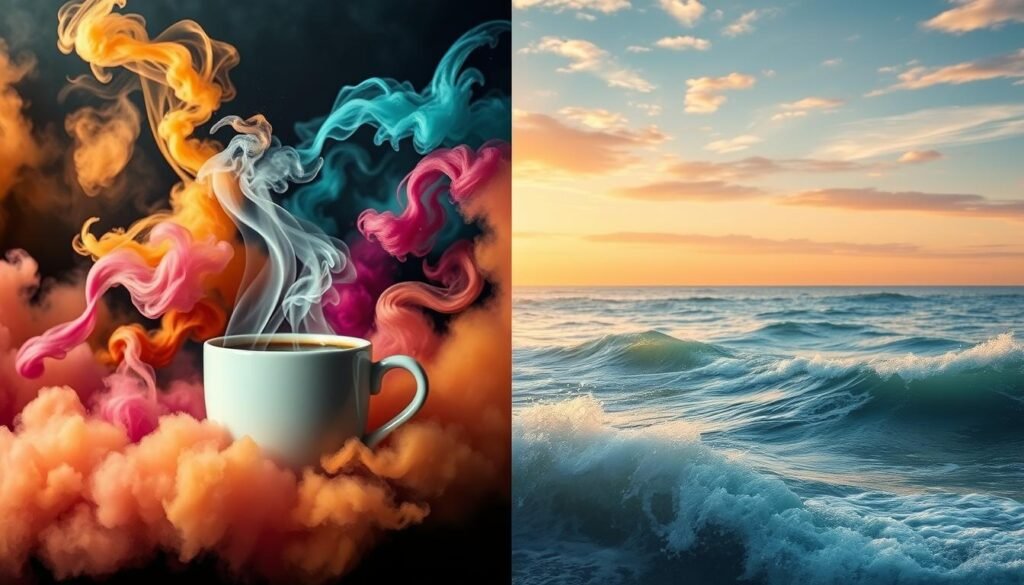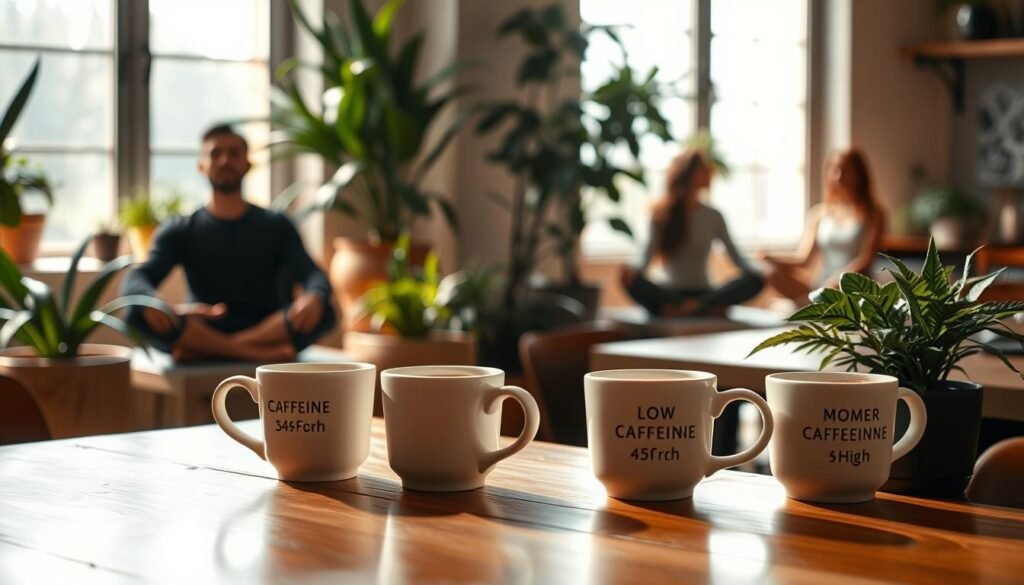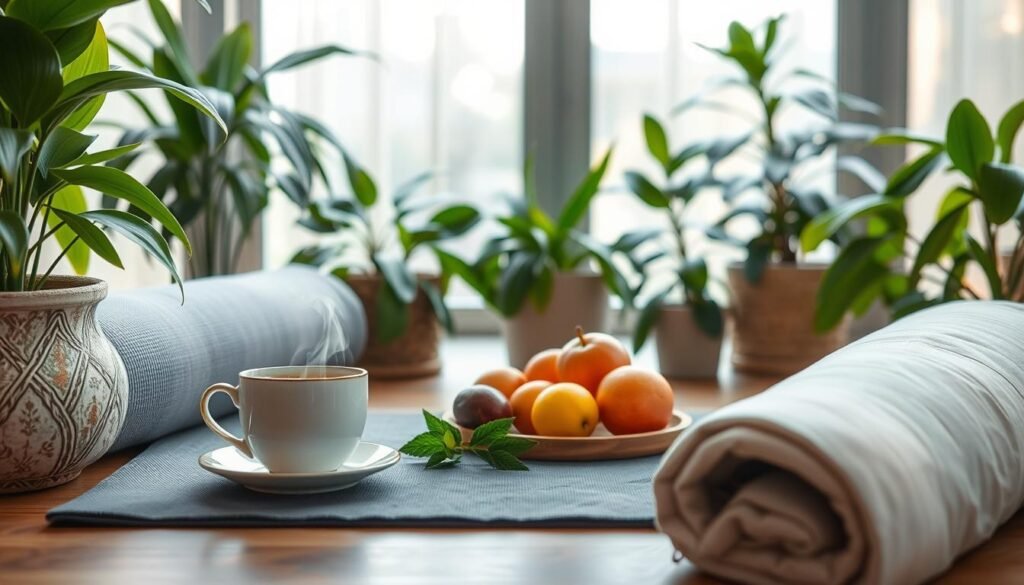Did you know 85 percent of people in the U.S. have caffeine every day? Yet, around 31 percent of U.S. adults might face an anxiety disorder at some point. This hints at a possible link between how much caffeine we drink and anxiety. Experts say small amounts of caffeine, like 50 to 200 mg, are okay. But taking more than 400 mg can cause problems. This info is crucial for young people. Teens are advised to keep their caffeine under 100 mg daily. With drinks like a tall Starbucks having about 250 mg of caffeine, it’s clear why cutting down is important.
It’s key to know how caffeine and anxiety are connected if you’re looking to feel better. Tons of research shows too much caffeine can make you feel nervous, restless, and upset your stomach. Cutting back on caffeine is a new popular way to handle anxiety, according to research. People who get anxious easily can really benefit from watching their caffeine use. By doing so, they’re supporting their mental health in a big way.
Key Takeaways
- 85% of U.S. adults consume caffeine daily, linked to anxiety disorders.
- Exceeding 400 mg of caffeine can lead to anxiety-like symptoms.
- Adolescents should limit caffeine intake to no more than 100 mg per day.
- Monitoring caffeine consumption is crucial for managing anxiety levels.
- Reducing caffeine can provide significant relief for sensitive individuals.
Understanding Caffeine and Its Impact on Anxiety
About 85% of people in the U.S. drink a caffeinated beverage every day. Caffeine, a stimulant, can influence anxiety-related brain chemicals. Many studies have found that caffeine can increase anxiety levels.
Even low doses of caffeine may raise the risk of anxiety a little, with a mean difference of 0.61 found. This means even a small amount can affect anxiety. Very high caffeine intake, over 400 mg, is even more risky, with studies showing a significant increase in anxiety symptoms.
Having caffeine similar to five coffee cups may trigger panic attacks in some. It’s so significant that there’s a term for it: Caffeine-induced anxiety disorder. Lowering caffeine can help people who feel anxious from it, especially those more affected by its effects.
Find out more about how caffeine impacts anxiety by reading this detailed study.
What is Caffeine?
Caffeine is a stimulant that boosts alertness and energy levels. It’s found in coffee, tea, chocolate, and some soft drinks. Understanding caffeine shows how important it is in our daily lives.
About 85% of U.S. adults consume caffeine every day. They take in around 135 milligrams daily, like drinking 12 ounces of coffee. The FDA says consuming less than 400 milligrams daily is safe for most people. This shows how common caffeine is in our lives.
Caffeine gets into the blood fast, usually within 45 minutes. Its effects can last for hours due to its half-life. This varies by person due to different factors such as genetics. Heavy use can lead to sleep problems for some. It’s smart to know the sources of caffeine to control intake.
Caffeine can improve mood and make workouts feel easier. But, it might also make some people feel more anxious. For people not used to caffeine, stopping it can cause withdrawal symptoms pretty quickly. This shows how strong caffeine’s effects can be.
| Caffeine Source | Average Caffeine Content (mg per serving) |
|---|---|
| Coffee (8 oz) | 95 |
| Black Tea (8 oz) | 47 |
| Green Tea (8 oz) | 29 |
| Soft Drinks (12 oz) | 40 |
| Energy Drinks (8 oz) | 80 |
Knowing the sources of caffeine helps manage how much you consume. It’s key to balancing caffeine’s effects with your health goals. This balance affects daily life and overall wellbeing.
How Caffeine Triggers Anxiety Symptoms
Today, about 85% of the U.S. population drinks caffeinated beverages every day. While it wakes us up, it also triggers anxiety for some. Knowing why can help us see its big impact.
Caffeine wakes up the central nervous system, which makes adrenaline levels go up. This can cause a faster heart rate, jitteriness, and stomach issues. If you’re sensitive to caffeine, these problems can turn into worse anxiety, including panic attacks.
Studies show that people with panic disorders are more affected by caffeine. About 51.1% of them had a panic attack after having caffeine. This reaction is less common in people without panic disorders. Their existing anxiety makes their bodies react more to caffeine.
This table shows how caffeine impacts people with and without panic disorders differently:
| Population | Panic Attack after Caffeine (%) | Panic Attack after Placebo (%) | Increase in Subjective Anxiety (Hedges’ g) |
|---|---|---|---|
| Panic Disorder Patients | 53.9 | 0 | 1.02 |
| Healthy Controls | 1.7 | Data Limited | Data Limited |
In the U.S., people take in around 165 mg of caffeine daily. This amount matters for mental health. The U.S. Food and Drug Administration says over 400 mg a day could make anxiety worse. This is especially true for those prone to anxiety. Knowing about caffeine anxiety can help people make better choices for their mental health.
The Link Between Caffeine and Anxiety Disorders
Caffeine is a big part of daily life for many Americans. It helps them stay alert and fight off tiredness. But, it can be a problem for those with anxiety disorders.
Studies link high caffeine use to more anxiety symptoms. People with conditions like panic disorder or social anxiety may get worse with caffeine. Although healthy adults might handle 400 mg of caffeine, it’s not safe for everyone. Even moderate amounts can make some people feel nervous and lose sleep.
For those sensitive to caffeine, a little can cause big issues. There’s a chance that anxiety leads to more caffeine use, which then boosts anxiety even more. This creates a tough cycle to break.

Stopping caffeine use can lead to withdrawal symptoms like headaches and tiredness. That makes quitting tough. It’s key to know how caffeine affects you. Tracking your intake and symptoms can help manage caffeine and anxiety disorders. Trying herbal teas might help those looking for calm without caffeine’s buzz.
In summary, it’s tricky to balance caffeine and anxiety. Knowing your limits and making smart choices about caffeine can help handle anxiety better. For those with nighttime anxiety, mindfulness can improve sleep, helping with anxiety management. Find more tips on managing sleep and anxiety here.
Reducing Caffeine Intake for Anxiety Relief
Many people looking to ease anxiety find cutting back on caffeine helps a lot. Taking it slow is better than stopping all at once. This avoids any withdrawal symptoms like headaches or feeling tired. Here are some tips and alternatives to make it easier.
Gradual Reduction Strategies
First, keep track of how much caffeine you drink each day. Find out all the different ways you’re getting caffeine. This might include drinks like:
- Arabic coffee
- Specialty coffee
- Black tea
- Cola
- Regular coffee
Then, make a plan to slowly drink less caffeine. For example:
- Reduce your caffeine by 10-25% each week.
- Swap a caffeinated drink for one with less caffeine every day.
- Have caffeine-free days to help your body rest.
By doing it this way, you can adjust without feeling overwhelmed. It makes cutting down on caffeine for anxiety control smoother.
Alternative Beverages to Consider
Looking for drinks without caffeine keeps your routine enjoyable. Here are some good choices:
- Herbal teas (like chamomile and peppermint)
- Decaf coffee
- Fruit-infused water
- Green tea (but not too much)
These alternatives are not just tasty. They could also help you relax. Like, herbal teas have been shown to help with anxiety. Picking the right substitutes lets you have your favorite drinks without too much caffeine.
| Beverage | Caffeine Content (mg) | Potential Benefits |
|---|---|---|
| Arabic Coffee | 95 | Energy boost |
| Specialty Coffee | 200 | Increases alertness |
| Black Tea | 47 | Rich in antioxidants |
| Chamomile Tea | 0 | Promotes relaxation |
| Decaf Coffee | 5 | Satisfies coffee cravings |
Identifying Your Caffeine Sensitivity
Understanding how we react to caffeine is key to managing caffeine-related anxiety. People react differently to caffeine. So, it’s important to watch how much we drink. Knowing how sensitive you are to caffeine can help reduce anxiety and make you feel better overall.
Keeping a Caffeine Journal
Keeping a detailed caffeine journal is a good way to find out your caffeine sensitivity. In your journal, you should note:
- Date and time of consumption
- Type of caffeine (e.g., coffee, tea, energy drinks)
- Quantity consumed
- Any accompanying food or drink
- A log of noticeable symptoms following consumption
By writing down these details, you can link your caffeine use to symptoms of anxiety. This helps identify how much caffeine your body can handle.
Recognizing Symptoms of Caffeine Anxiety
People can have different symptoms from caffeine anxiety. Some common ones include:
- Increased heart rate
- Restlessness or jitteriness
- Nervousness or heightened anxiety
- Difficulty sleeping
- Gastrointestinal disturbances
Even a small amount of caffeine can cause these symptoms in sensitive people. Paying attention to these reactions helps find out if you’re sensitive to caffeine.

Becoming aware of how caffeine affects you lets you make smart choices. This knowledge is crucial for controlling anxiety and knowing your caffeine limits.
Managing Caffeine-Induced Anxiety
Caffeine-induced anxiety can make you feel uneasy. That’s why knowing quick and long-term ways to feel better is important. These methods help you feel calm and reduce anxiety symptoms.
Immediate Relief Techniques
Quick help for caffeine anxiety includes some simple steps. Drinking enough water is key because not having enough can make you more anxious. Deep breaths, especially using the 4-7-8 technique, bring calmness.
Doing light exercises like walking or stretching helps break down caffeine. Writing down what makes you anxious can also point out what to avoid.
Long-Term Strategies for Anxiety Management
Long-term plans improve mental health over time. Cutting down on caffeine, especially if you consume more than 400 milligrams daily, is a good start. Try decaf coffee for the taste without the worry. Daily mindfulness and regular exercise with healthy eating support your mental well-being. If caffeine bothers you for a long time, talk to a doctor. For more about easing caffeine anxiety, check this article.
| Technique | Description |
|---|---|
| Staying Hydrated | Maintain adequate water intake to counter dehydration effect on anxiety. |
| Deep Breathing | Practice deep breathing techniques like the 4-7-8 method to promote relaxation. |
| Light Physical Activity | Engage in walking or stretching to help lower anxiety levels. |
| Gradual Caffeine Reduction | Slowly reduce caffeine intake to minimize withdrawal symptoms. |
| Mindfulness Practices | Incorporate mindfulness meditation to reduce anxiety symptoms over time. |
Healthy Lifestyle Choices to Support Anxiety Management
Adding healthy lifestyle choices can really help with managing anxiety. Eating well and exercising not just improves your body, but your mind too. It’s interesting how a good diet and physical activity work together to balance emotions. Plus, practicing mindfulness helps reduce stress and makes managing anxiety easier.
Importance of Diet and Exercise
For controlling anxiety, a healthy diet is key. Eating protein in the morning keeps you full and balances blood sugar. Foods high in carbohydrates can increase serotonin, which makes you feel more relaxed. Drinking enough water is also important because even being a little dehydrated can make you feel more anxious. Eating fruits, vegetables, and omega-3 rich foods like fatty fish helps with anxiety. On the other hand, too much processed food and added sugars can make stress worse.
- Include healthy, balanced meals such as:
- Fresh fruits and vegetables
- Whole grains
- Lean protein sources
- Fatty fish rich in omega-3 fatty acids
- Nuts and seeds for essential minerals
- Limit caffeine intake, particularly 10 hours before sleep to reduce anxiety-related jitters.
- Avoid alcohol, as it can have a paradoxical effect on mood once metabolized.
Mindfulness and Stress Reduction Practices
Mindfulness practices like yoga and meditation help you stay focused on the present. They reduce anxiety caused by daily stress. Also, having a support system and building strong relationships are part of a good self-care routine. Making these lifestyle changes and staying active are strong moves for managing anxiety over time.
To sum it up, choosing the right food, keeping active, and practicing mindfulness support a healthier lifestyle. This can help reduce anxiety symptoms and improve overall well-being.

| Dietary Component | Benefit for Anxiety |
|---|---|
| Protein (e.g., eggs) | Helps maintain steady blood sugar levels |
| Carbohydrates (e.g., whole grains) | Boosts serotonin production |
| Omega-3 Fatty Acids (e.g., salmon) | Improves mood and reduces anxiety symptoms |
| Hydration | Prevents mood swings due to dehydration |
| Dark Chocolate (70% cacao) | Reduces stress and anxiety |
Consulting with Professionals for Caffeine Anxiety
Many people find relief from consulting professionals for anxiety relief when caffeine makes their anxiety worse. If you notice that caffeine is making you feel more anxious, it might be time to get help. Mental health experts can show you ways to deal with these feelings well.
Understanding the difference between being sensitive to caffeine and having an anxiety disorder needs expert advice. A professional can tell if your symptoms are from caffeine or other deep mental health issues. Seeking help for caffeine-induced anxiety could lead to using therapy, mindfulness, or sometimes medicines.
A lot of caffeine users could be depending too much on it, studies suggest. Watching how much caffeine you take and seeing how it changes your anxiety is key. Getting advice from health professionals helps understand what triggers your anxiety and how to control it related to caffeine.
Conclusion
Lowering caffeine intake is key for those feeling more anxious. This article shows that caffeine can affect mental health, especially in sensitive individuals. Guidelines suggest that up to 400mg of caffeine daily is okay for most. But, many people drink more than this.
To lower anxiety, try reducing caffeine slowly and try other drinks. Everyone reacts differently to caffeine. So, tracking your caffeine use can show what affects you. With careful choices, managing anxiety while still enjoying caffeinated drinks is possible.
It’s vital to know how caffeine and anxiety interact. Anxiety disorders are becoming more common worldwide. Remember, managing caffeine is not just about drinking less. It also means adopting healthier lifestyle habits for better mental health.